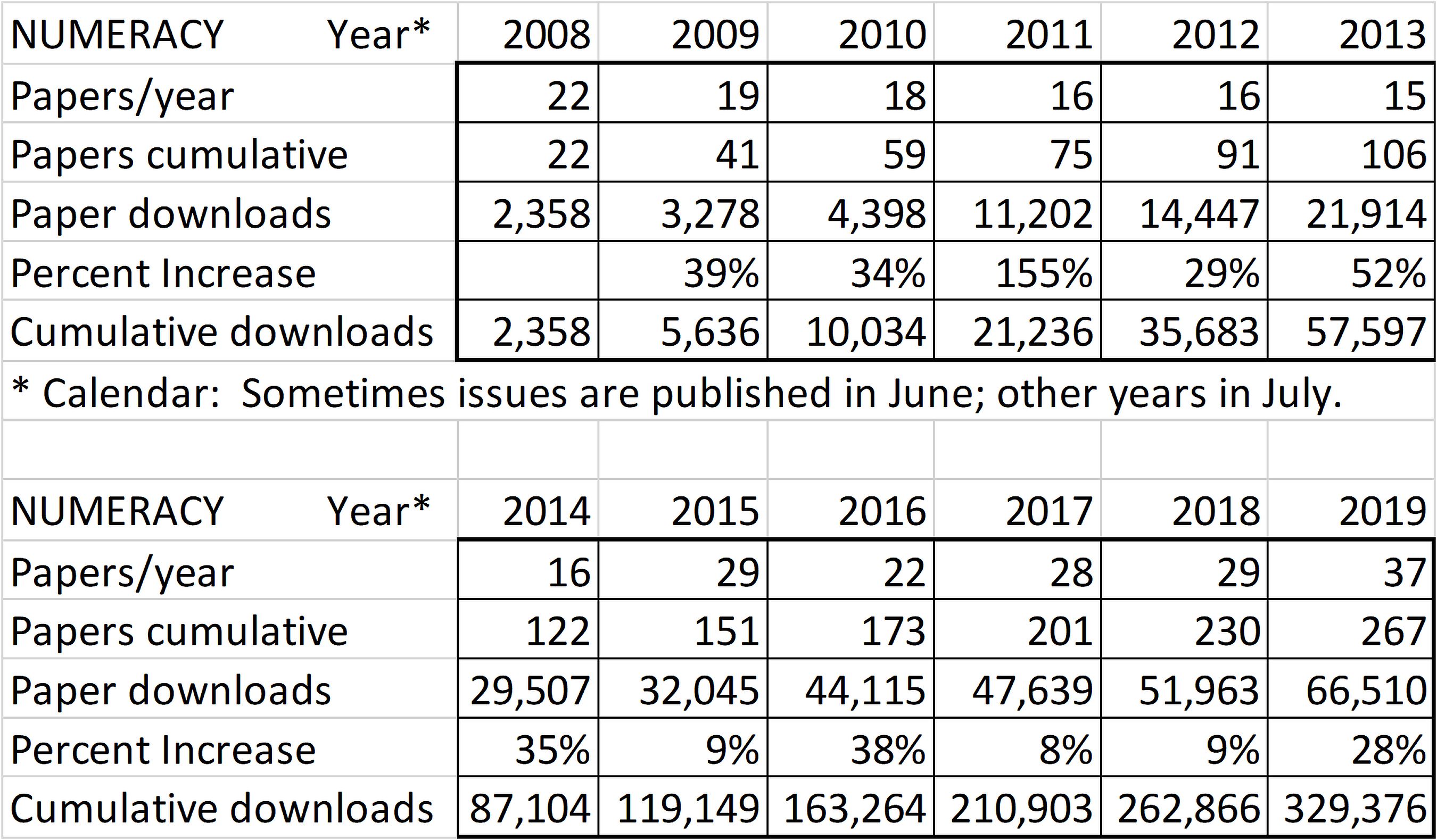 |
|
The graphic in the banner is “Wave of Numbers” by Beth Fratesi, ©2007, inspired by “a world awash in numbers,” Mathematics and Democracy: The Case for Quantitative Literacy (NCED, 2001).
The Journal
Numeracy (ISSN 1936-4660) is the open-access, peer-reviewed, electronic journal of the National Numeracy Network (NNN).
Numeracy supports education at all levels. It is interdisciplinary, drawing authors from mathematics, statistics, the natural and social sciences, and the humanities. The journal is open access with no fee or membership required for authors or readers. It is supported by the University of South Florida Libraries.
Editorial Artificial Intelligence, Basic Skills, and Quantitative Literacy Gizem Karaali | Recent Article Focused on Pedagogy: QR Grading Rubrics for Written Arguments Ruby Daniels, Kathryn Appenzeller Knowles, Emily Naasz, and Amanda Lindner | Book Review How to Become a Numbers Person: Review of Making Numbers Count, by Chip Heath and Karla Starr (2022) Jena Barchas-Lichtenstein |
Prospective authorsProspective authors are not required to review other submissions as part of their submission. See the instructions to authors page for more information. |
Staff
- Executive Editor: Nathan D. Grawe , Carleton College
- Senior Editors:
- H. L. (Len) Vacher, University of South Florida
- Gizem Karaali, Pomona College
- Bernard L. Madison, University of Arkansas (Co-founder of NNN)
- Contributing Editor: Joel Best, University of Delaware
- Book Review Editor: Michael T. Catalano, Dakota Wesleyan University
Context and History
Len Vacher and Dorothy Wallace, two of the NNN's founding board members, had a grand plan to fill a major void: create a peer-reviewed journal to "promote education that integrates quantitative skills across all disciplines and at all levels." At the NNN's August 2006 board of directors' meeting in Seattle, Vacher and Wallace proposed the idea for the journal, which was unanimously approved. They then got to work. In December 2006, Wallace, Vacher, and Todd Chavez, from the University of South Florida's Libraries, guided a subset of NNN board members and associate editors in a journal planning meeting at Dartmouth College.
The planners agreed that the journal should publish scholarly research and evidence-based case studies on a wide array of QL topics, including education research, teaching strategies and resources, curriculum design, assessment strategies, and faculty development. They agreed that the journal's scope should also include perspectives, notes, reviews, and commentaries. Since its first edition on January 1, 2008, Numeracy has published two issues per year. By the start of 2013, Numeracy had more than 32,000 downloads. We hope you enjoy reading the journal and that you will consider submitting to it, as well.

In 2015, Numeracy was awarded the Directory of Open-Access Journals (DOAJ) Seal for its high degree of openness and for adhering to best practices and high publishing standards. In 2019, Numeracy was accepted for indexing in the Scopus Journal of Metrics. Scopus is the largest abstract and citations database of peer-reviewed literature. Their Cite-Score is an open-access tool for documenting the scholarly impact of journals and their publications.
Steen Award
The National Numeracy Network (NNN) hosts the annual Steen award. Named for Lynn Steen, one of the early leaders of the quantitative literacy movement and author of many influential works promoting QL, the award goes to the best article from the most recent volume of the NNN’s journal Numeracy as judged by the Awards Subcommittee of the Board of NNN. Criteria for selection include the overall quality of the paper, its effectiveness in promoting a significant numeracy theme or the movement in general, use of evidence-based research in QL, possible impact on teaching and learning within QL, and relevance to larger societal issues impacted by QL.
Each year, the NNN selects one article from the prior-year issues of Numeracy as being the 'best paper". The author(s) of that paper will receive the Lynn Steen award. The articles reviewed include only the peer-reviewed content: articles, perspectives, and notes. They exclude anything that is not peer-reviewed such as editorials and book reviews. The NNN President selects the committee.
The criteria is quite flexible, but it should uphold or advance the idea of numeracy
- as being important for a citizen in a modern democracy [Lynn Steen];
- as being a habit of mind [Bernie Madison];
- as being applicable across the curriculum;
- as being inclusive: quantitative reasoning, quantitative literacy, statistical literacy, health literacy, financial literacy, etc.;
- as being of value students;
- as being relevant to reading and interpreting data.
